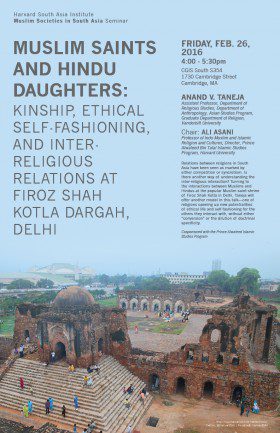Muslim Societies in South Asia
Anand V. Taneja, Assistant Professor, Department of Religious Studies, Department of Anthropology, Asian Studies Program, Graduate Department of Religion, Vanderbilt University
Chair: Ali Asani, Professor of Indo-Muslim and Islamic Religion and Cultures; Director, Prince Alwaleed Bin Talal Islamic Studies Program, Harvard University
Relations between religions in South Asia have been seen as marked by either competition or syncretism. Is there another way of understanding the inter-religious interaction? Turning to the interactions between Muslims and Hindus at the popular Muslim saint-shrine of Firoz Shah Kotla in Delhi, Taneja offers another model in this talk—one of religions opening up new potentialities of ethical life and self-fashioning for the others they interact with, without either “conversion” or the dilution of doctrinal specificity. At Firoz Shah Kotla, the ethics of social interaction are anti-identitarian. People actively avoid asking each other’s names, which easily identify one’s religious community and caste. Instead, people follow an ethic of nameless intimacy, where they become friends and share intimate secrets while, on one level, remaining strangers. Women, for example, freely express their disaffection with the often oppressive structures of their natal and marital families. The ability to form communities of hamdardi (shared pain/empathy) while stepping out of one’s socially determined identity, Taneja argues, is a major factor in the healing power of Muslim saint shrines such as Firoz Shah Kotla. This healing efficacy can be linked to anti-patriarchal strands within Islam and to the Islamic ethic of gharib-navazi (hospitality to strangers/others), associated in particular with the Chishtiya Sufi order in South Asia. By offering us a model of Islam as an ethical inheritance as opposed to a religious identity, Firoz Shah Kotla forces us to rethink normative ideas of religion, and the role of Islam in the ethical and religious life of North India.
Cosponsored with the Prince Alwaleed Islamic Studies Program

